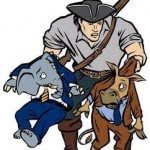 Burton W, Folsom has received quite a bit of attention for "New Deal or Raw Deal: How FDR's Legacy has Damaged America" released last November. Certainly, that book was timely with a new regime of Leftists who have even grander goals for growing the government and defeating freedom than did Franklin Roosevelt. However, a book that Folsom originally published over 20 years ago (and that is now in its 5Th edition) is also important to understanding the truth behind the Left's attacks on America's productive class. "The Myth of the Robber Barons" explodes the typical textbook treatment of America's pioneering entrepreneurs.
Burton W, Folsom has received quite a bit of attention for "New Deal or Raw Deal: How FDR's Legacy has Damaged America" released last November. Certainly, that book was timely with a new regime of Leftists who have even grander goals for growing the government and defeating freedom than did Franklin Roosevelt. However, a book that Folsom originally published over 20 years ago (and that is now in its 5Th edition) is also important to understanding the truth behind the Left's attacks on America's productive class. "The Myth of the Robber Barons" explodes the typical textbook treatment of America's pioneering entrepreneurs.The core of Folsom's work involves case studies of the careers and innovations of a group of late 19Th and early 20Th century business icons including Cornelius Vanderbilt, John D. Rockefeller, James J. Hill, Charles Schwab, Andrew Mellon and the Scranton family. These giants of American commerce are explained and celebrated while still addressing their more troubling aspects. The book concludes with an examination of how three of America's most used textbooks portray the so-called "robber barons."
Without divulging too much of "The Myth of the Robber Barons," this book makes an important distinction between "market entrepreneurs" and "political entrepreneurs." This is a vital distinction in understanding the actions of businessmen and the impact their decisions have had on the economy. In other words, there is a difference in character and result between those who have taken risks in the free market and those who have invested in government as a conduit to fiscal success. The market entrepreneurs have a better record of success in every measure.
This book has great relevance to today's business environment. The entanglement of industry and government grew throughout the 20Th century and has picked up speed in the 21st. The most naked attempt to marry the two occurred with Franklin Roosevelt's National Industrial Recovery Act which attempted to organize most American industries into non-competitive cartels. Fortunately, the Supreme Court struck down this anti-capitalist nonsense, but Congress would not be deterred. The recent crises in the housing, banking and automobile industries are great examples of how money, power and influence are exchanged between corporate America and the Kremlin on the Potomac. It is no accident that Fannie Mae and Freddie Mac have exchanged executives with Democrat administrations, contributed mass amounts of money to the party's candidates (most especially Chris Dodd and Barack Obama), and were protected by Dodd and Bahney Fwank when their lending practices were called into question. Then, of course, when the house of cards collapsed it was the fault of GREEDY CAPITALISTS (who, by definition, are Republicans).
You can read the lessons of "political entrepreneurs" into the Global Warming boondoggle. Just check how many influential members of Congress are invested in energy companies. Al Gore has created a crisis that can only be solved by companies from which he profits. The government deciding which industries will live and which will die is a feature of a fascist or socialist system, not a capitalist one. There is one hard truth the anti-capitalists cannot refute: capitalism made America great. And what is capitalism? Liberty. It is a system of individuals working to achieve their needs and wants in a free-as-possible market place. There is success and there is failure, but individuals ultimately decide the winners and losers by their free choices.
There is little wonder politicians can so easily sell the "greedy rich" claptrap to the dumb masses. Folsom analyzes the treatment of the rise of American industry by major textbooks and finds a biased presentation that shows the men who built America as a bunch of greedy exploiters. Forget innovation. Forget improving the standard of living for the vast majority. Forget the expansion of the American and world economy. They were vile thugs who took advantage of the poor and built their wealth on the backs of the rabble.
"The Myth of the Robber Barons" is a short read (you could easily knock it out in one undisturbed evening even if you take notes) that will expand your depth of knowledge on the importance of the entrepreneur in growing the American economy. You will find many parts of the book applicable to the current extension of Leviathan's tentacles into the industrial world. An understanding of the real history of big business in America provides perspective to the hysterical bogeymen propped up by the education establishment, the state-run media and the political class.








No comments:
Post a Comment